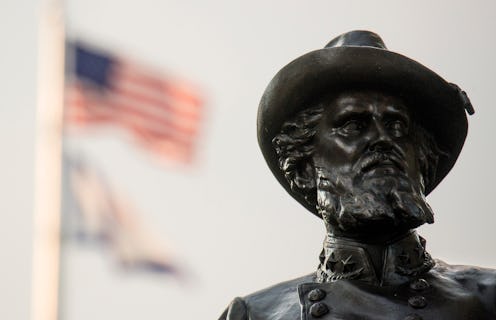News
9 States Where Confederate Monuments Still Exist & How To Help Get Them Removed

Plans to remove Confederate Gen. Robert E. Lee's statue in Charlottesville, VA sparked enough outrage the past weekend that white nationalists protested and those who opposed their stance formed counter protests. The clash led to violence, with at least three people dead and dozens of others injured. But Lee's statue isn't the last of those honoring Confederate leaders throughout the country. There are still hundreds of Confederate monuments standing in the United States, and they've sparked fierce debate on whether they should be allowed to stand.
According to USA Today, estimates put the number of Confederate monuments throughout the states between 700 and 1,000. In 2016, the Southern Poverty Law Center (SPLC) commissioned a catalog of the remaining Confederate symbols and names throughout the country. They found 1,503 different symbols, statues, monuments, or things named in honor of the Confederacy. They discovered 718 monuments and statues in total, with around 300 of them residing in Georgia, Virginia, and North Carolina.
And not all of them are relics of the past. North Carolina alone has reportedly added 35 Confederate monuments in the last 17 years, according to USA Today.
However, there has been some progress in recent years of states removing their memorials to Confederate figures. According to the SPLC, at least 60 Confederate memorials or symbols have been removed since 2015. In St. Louis, the city removed its Confederate monument in June, and New Orleans removed a statue of Gen. Lee in May and faced public outcry.
Even though more and more Confederate monuments are being removed from public spaces, there are still so many left that serve as a reminder of America's dark past. Below are some of the states with Confederate symbols currently being fought over throughout the United States.
In Tennessee
People are campaigning for statues of Gen. Nathan Bedford Forrest and president of the Confederate states Jefferson Davis to be removed from the city. However, as of 2013, Tennessee has a law barring the removal of the statues. You can sign the Change.org petition to remove the Davis and Forrest statues.
In Alabama
The state signed a law in May to preserve Alabama state monuments, barring their removal, alteration, or renaming for 40 or more years. Montgomery, AL was also the site of the first Confederate capital. The Southern Poverty Law Center has fought back against the decision.
In North Carolina
According to North Carolina's WRAL.com, more than 70 counties in North Carolina have at least one memorial dedicated to the Confederacy (and 17 have multiple monuments). However, this number doesn't count federal and state highway markers, historic trails, or private monuments with connections to the Confederacy. The state reportedly contains more Civil War monuments than any other war, and a 75 foot statue of a Confederate soldier stands at North Carolina's capitol.
North Carolina reportedly houses 90 Confederate monuments, with 140 different things dedicated to the Confederacy, like streets and highway markers. However, the state also has a bill to preserve memorials.
In Georgia
Following the events in Charlottesville, residents are calling for the removal of a Confederate memorial in Decatur, a county in Atlanta. You can sign this petition and read residents' comments regarding the memorial.
In Virginia
The fight in Charlottesville may have centered on one statue, but it's certainly not the only one in the state. Richmond was another capital of the Confederacy, and leaders in the city are currently debating on how to handle remaining monuments. Rather than removing the monuments, leaders in Richmond are discussing ways to give them context. Richmond even has a street named Monument Avenue, according to NPR, which holds many monuments of the Confederacy.
In Maryland
Baltimore mayor Catherine Pugh declared on Monday that the city will take down Confederate statues. Pugh said she is looking into the cost of removing the statues from the city and potentially placing them in Confederate cemeteries instead. Others on the Baltimore city council are calling for the statues to be destroyed rather than moved. Elsewhere in Maryland, House Speaker Michael E. Busch is calling for the removal of a statue of Supreme Court Justice Roger B. Taney, who authored the Dred Scott decision.
In Florida
While Florida leaders, including Jeb Bush, have removed Confederate monuments and figures in Tallahassee, the Jacksonville city council president has called for the removal of such items in the city. Anna Lopez-Brosche wants to take inventory of the Confederate symbols on public property and potentially move them to museums, where they can be contextualized.
In Kentucky
In the wake of the public clashing in Charlottesville, Jim Gray, the mayor of Lexington, KY has announced he is petitioning to remove two Confederate statues from the city.
If you're interested in helping the fight to remove Confederate statues and monuments, the best thing you can do is write to the representatives, governors, and mayors of the cities who continue to fight for the preservation of these symbols to urge them to reconsider their position.